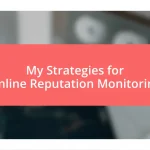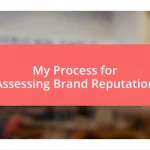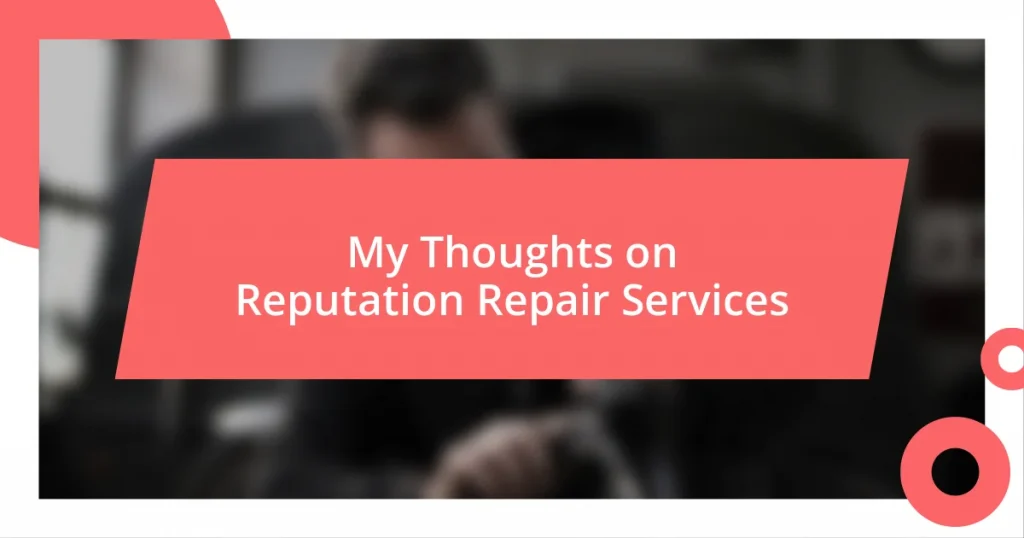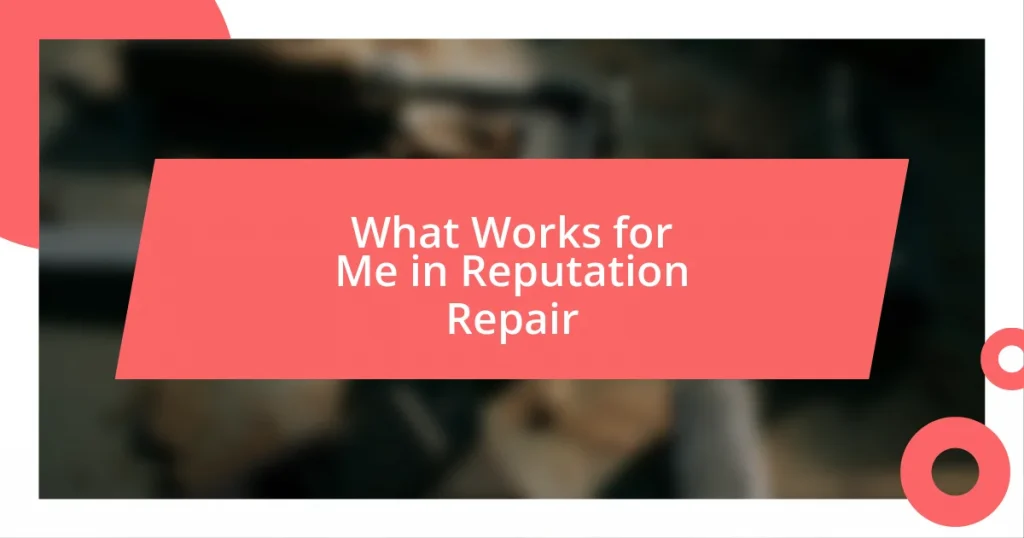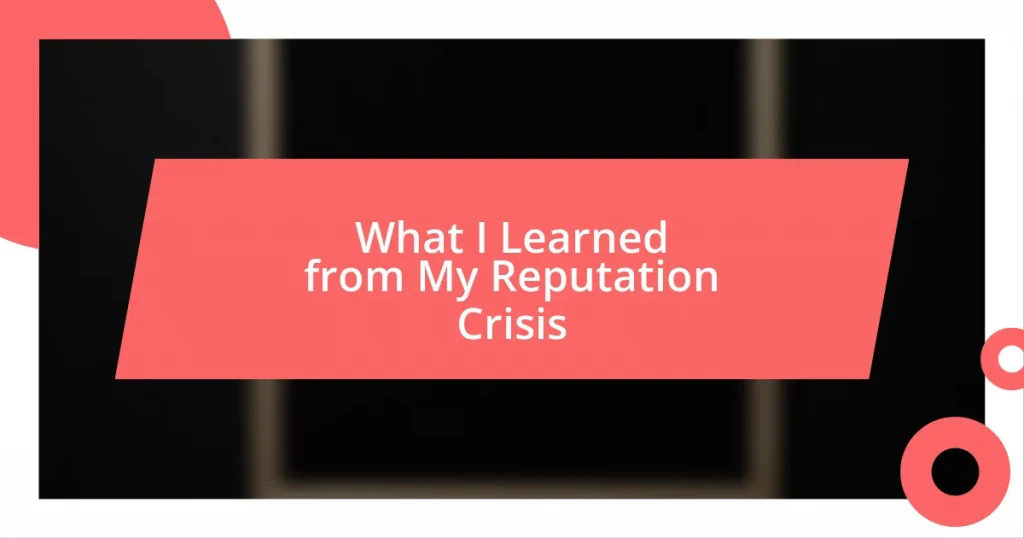Key takeaways:
- Reputation repair services utilize strategies like SEO and content creation to improve public perception, highlighting the importance of managing one’s online image.
- Damaging reputations can arise from social media missteps, negative reviews, and misinformation, emphasizing the need for proactive measures to mitigate harm.
- Effective reputation management involves consistent monitoring, transparent communication, and long-term relationship-building to create trust and foster loyalty.
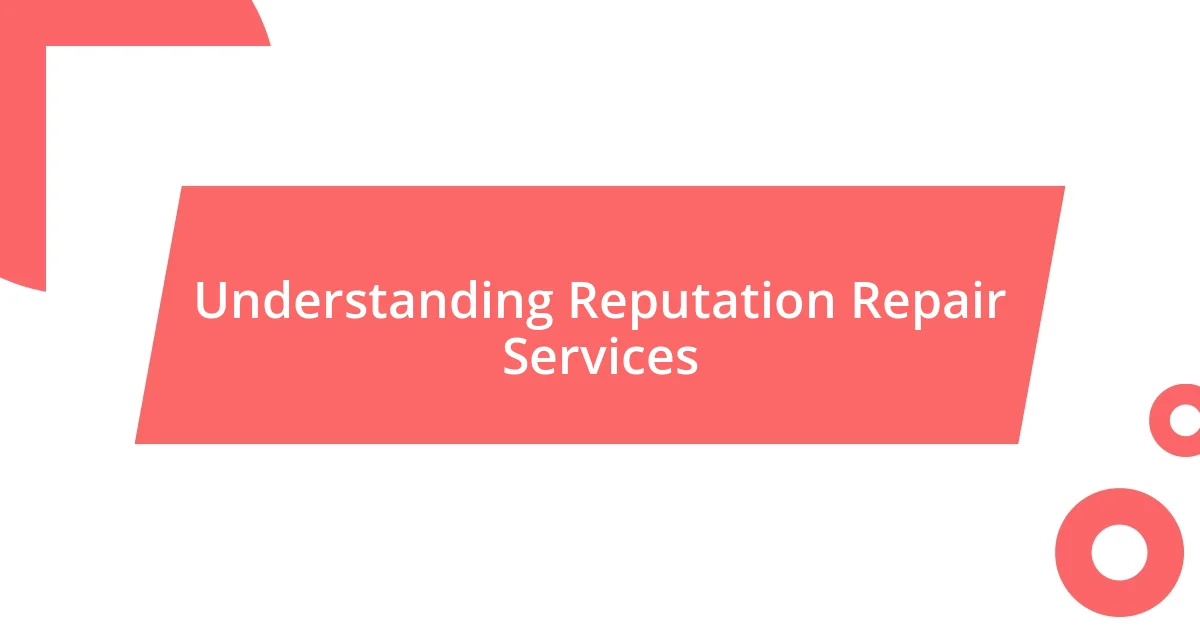
Understanding Reputation Repair Services
Reputation repair services focus on improving an individual or business’s public image, especially in response to negative online content. I remember when a friend’s business was hit by a wave of bad reviews, and they felt utterly helpless. It made me realize just how crucial an unblemished reputation is in today’s digital world.
These services typically employ strategies like search engine optimization (SEO), content creation, and online monitoring. I often find myself wondering if the investment in these services truly pays off. In my experience, seeing positive articles and reviews gradually replace negative ones can be incredibly uplifting, making the effort feel worthwhile.
Some might argue that reputation repair is simply manipulation of the truth, but I believe it’s about reshaping narratives. I recall chatting with a colleague who had undergone this process; their relief was palpable when they saw a shift in public perception. It’s reassuring to see how proactive measures can restore not just a brand’s image but also confidence, revealing the deeper emotional stakes involved in maintaining a good reputation.

Why Reputation Matters Today
Reputation today is more important than ever, especially in a world where information is just a click away. I recently spoke with a small business owner who shared how a single negative post on social media nearly derailed their company. It struck me how swift the impact of public perception can be, emphasizing that one’s reputation can dictate success or failure.
Here are some reasons why reputation matters in today’s landscape:
- First Impressions: A good reputation creates trust, which is crucial for attracting customers or clients.
- Competitive Edge: In a saturated market, reputation can be a deciding factor for consumers choosing between similar products or services.
- Long-Term Success: Positive reputation translates into loyal customers, which fosters sustainable growth.
- Crisis Resilience: Companies with a solid reputation are often forgiven more easily during crises, as they have built rapport over time.
- Personal and Professional Relationships: A strong reputation enhances networking opportunities and fosters collaborations, as people naturally gravitate towards trustworthy individuals and brands.
Reflecting on these points, I recall a pivotal moment in my career when I received feedback on how others perceived my work. It was eye-opening to learn that a good reputation not only influenced my professional relationships but also opened doors for new opportunities. It’s these experiences that continually reaffirm to me the vital role reputation plays in our personal and professional lives.
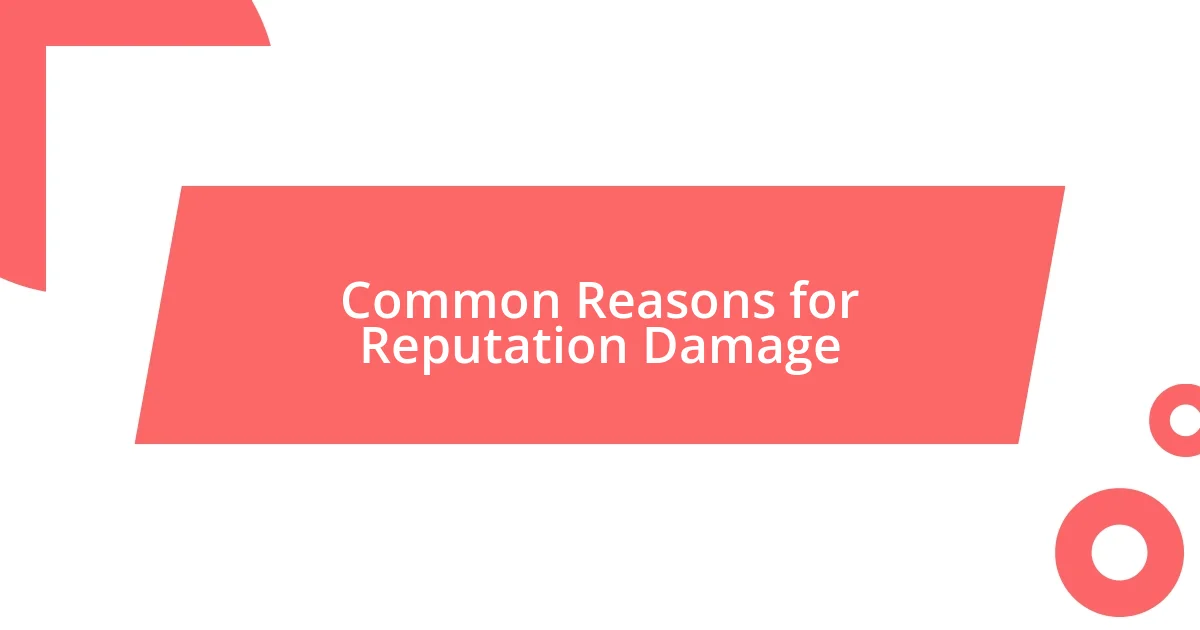
Common Reasons for Reputation Damage
Damage to one’s reputation can stem from a variety of sources, each carrying its own weight and impact. I remember an incident where an employee’s social media post, meant to be light-hearted, spiraled into a damaging publicity disaster for their employer. This illustrates how misunderstood intentions or careless words can lead to substantial reputational harm.
Another common culprit is negative online reviews, which often don’t tell the full story. I once read a restaurant’s response to a harsh review, which left me feeling sympathetic towards both sides. It drove home the point that even one bad review can outweigh many positive experiences if not handled thoughtfully.
In today’s interconnected world, misinformation or rumors can spread faster than wildfire. I’ve had firsthand experience where unfounded gossip about a friend caused significant distress, highlighting how quickly reputational damage can occur and the importance of addressing it before it spirals out of control.
| Common Reasons for Reputation Damage | Example |
|---|---|
| Social Media Mishaps | Careless posts leading to public backlash |
| Negative Online Reviews | One bad review overshadowing multiple positive experiences |
| Misinformation and Rumors | Gossip causing unnecessary distress and damage |
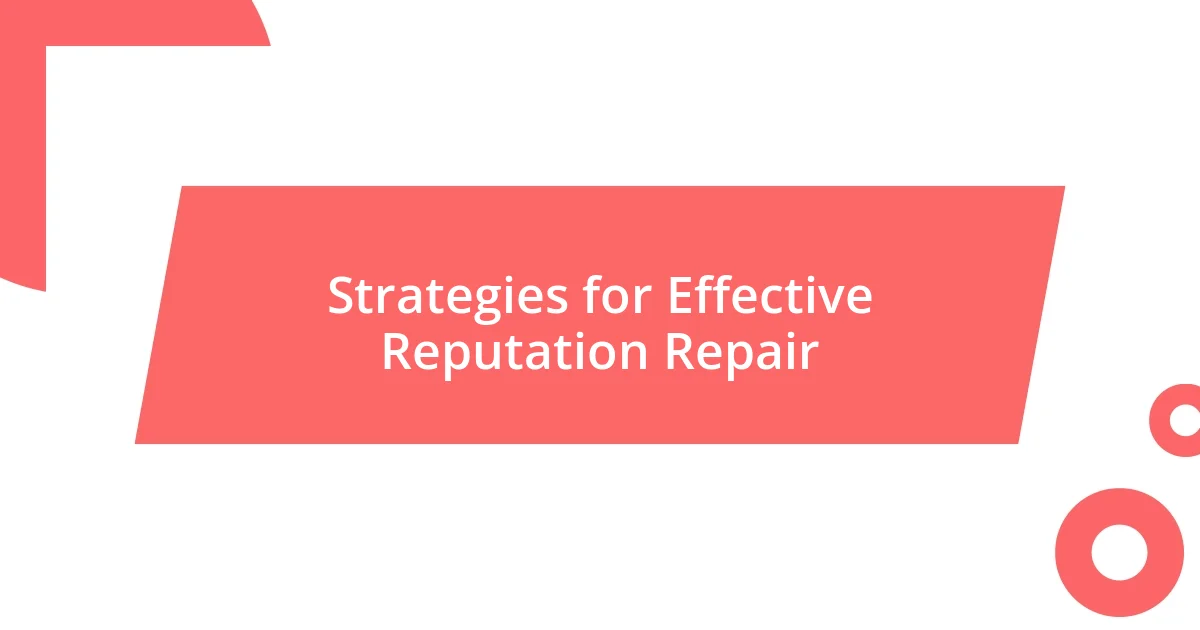
Strategies for Effective Reputation Repair
One effective strategy for reputation repair is proactively addressing negative feedback. I remember when a close friend faced a barrage of negative reviews for her small business. Instead of ignoring them, she engaged directly with her customers, offering apologies and solutions. This not only mitigated the damage but also demonstrated her commitment to customer satisfaction. Have you ever considered how straightforward communication can turn a dissatisfied customer into a brand advocate?
Monitoring your online presence is equally crucial. I learned this lesson the hard way when an unfavorable comment about my work went unnoticed for weeks. By the time I saw it, the conversation had escalated. Now, I set aside time regularly to check social media and review platforms. This practice helps me stay ahead of any potential issues before they spiral out of control.
Lastly, cultivating positive narratives about your reputation is essential. I once collaborated with a nonprofit that shared success stories from our projects, which painted us in a more favorable light. It made me realize that crafting authentic and positive content can reshape public perception significantly. What do you think happens when you highlight your strengths and contributions? Often, it makes people more willing to overlook past missteps.
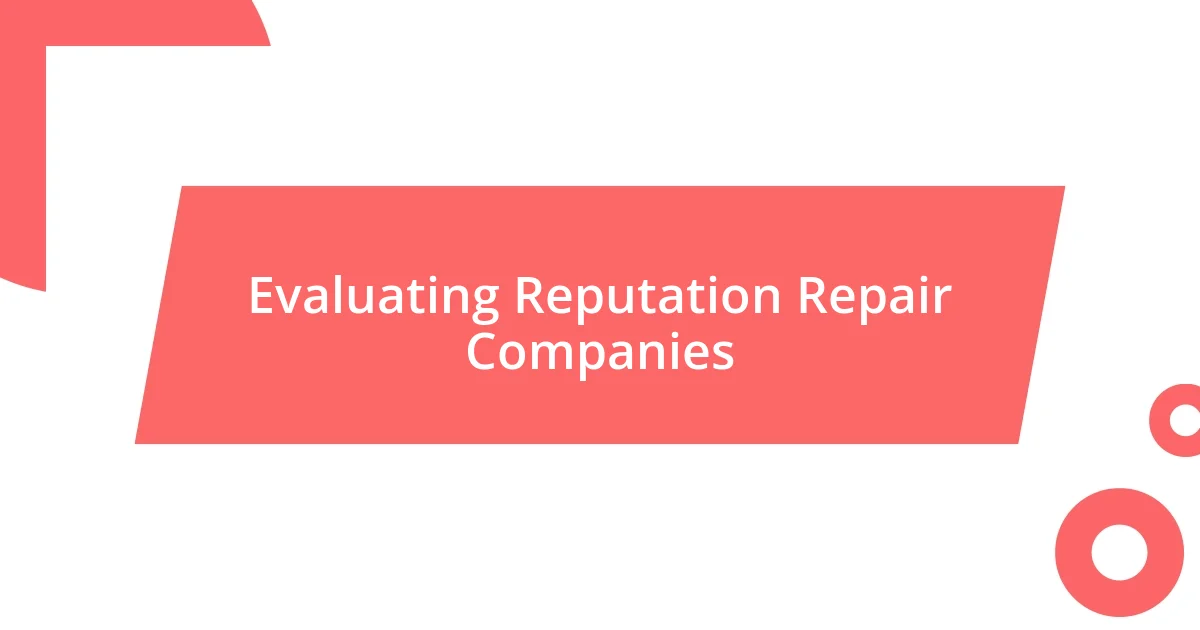
Evaluating Reputation Repair Companies
When evaluating reputation repair companies, I encourage you to look closely at their track record. For instance, I once consulted a firm known for its stellar client testimonials, only to discover that many were outdated or lacked verifiable details. It’s so easy to get swept up in glossy marketing but always dig deeper—are those reviews current and do they genuinely reflect results?
Additionally, consider their approach to strategy. I remember a company that promised quick fixes, which made me skeptical. Reputation repair often takes time and consistent effort. Does the company offer a tailored plan that considers your unique situation, or do they push a one-size-fits-all solution? I’ve learned that personalized strategies tend to yield the best outcomes, as they reflect the specific nuances of the reputation at stake.
Finally, transparent communication is a significant red flag when evaluating these services. I once partnered with a reputation repair firm that kept me in the dark about their tactics. Trust me, that leads to frustration and concern. Ask them how they will keep you informed, and ensure that there are clear channels for reporting progress. What about your involvement? Knowing your voice is part of the process can make all the difference.
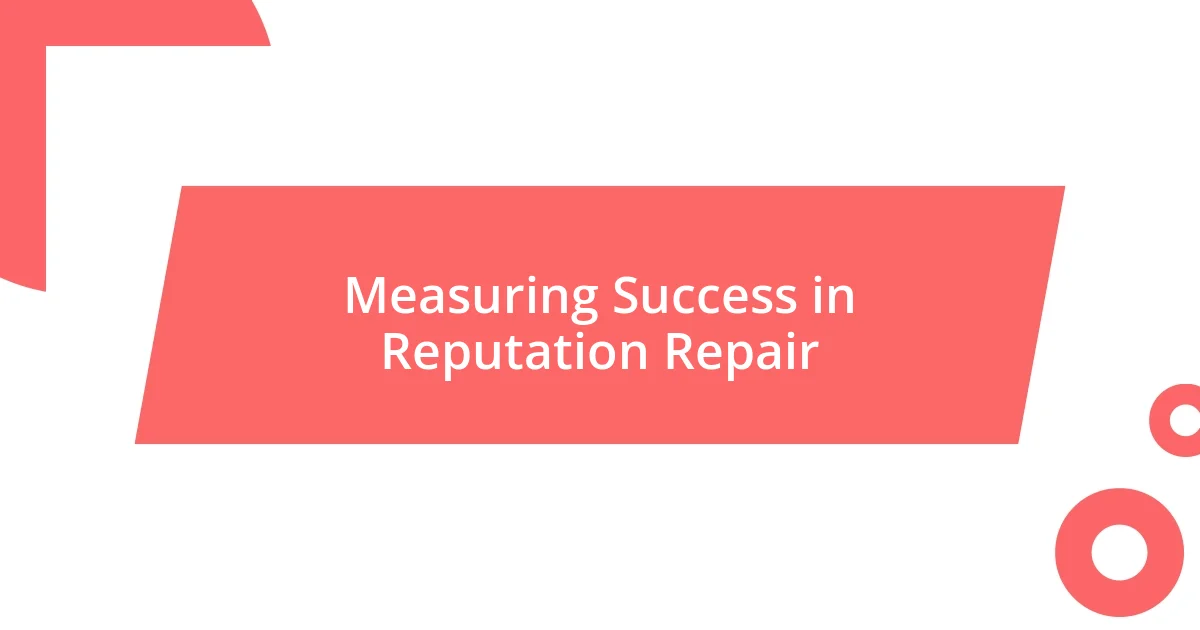
Measuring Success in Reputation Repair
Measuring success in reputation repair can be a bit tricky, but I’ve found that tracking key metrics makes a world of difference. For example, after a campaign to improve my online reputation, I closely monitored changes in my Google search rankings and social media engagement. Seeing those numbers shift positively felt like a huge win—it was tangible proof that the strategies I was implementing were working. Have you ever felt that rush when watching your hard work start to pay off?
Another important aspect is gathering feedback from customers or followers. I once conducted a simple survey after a reputation repair effort, asking clients how they perceived my brand now versus before. The responses were eye-opening! Not only did people recognize the positive changes, but many also expressed appreciation for the transparent communication I’d been fostering. This personal connection really reinforces that genuine progress is being made, doesn’t it?
Lastly, I believe that success should also be reflected in the quality of relationships built post-repair. I remember reconnecting with past clients who had previously been dissatisfied, and hearing how my efforts to improve had rekindled their trust. Maintaining ongoing conversations with them transformed those relationships into valuable partnerships. Isn’t it remarkable how repairing your reputation can pave the way for something even better than before?

Long-Term Reputation Management Practices
Implementing long-term reputation management practices can be a game changer for individuals and businesses alike. I still remember a time when I chose to engage in regular monitoring of my online presence. By setting up alerts for mentions of my name and brand, I felt more in control and able to respond proactively to any negative feedback before it gained momentum. How often do you take stock of what’s being said about you?
Consistent content creation also plays a crucial role in reputation management. I made it a habit to share industry insights and personal experiences on social media. This strategy not only showcased my expertise but also allowed me to build a community around my brand. Have you experienced how sharing valuable content invites trust and engagement from your audience?
Lastly, fostering relationships is key to maintaining a positive reputation over time. I took the step of reaching out to former clients and expressing genuine interest in their recent successes. This approach not only rekindled old connections but also reinforced my commitment to their growth. Have you ever noticed how a little personal touch can turn a simple interaction into a lasting bond?







